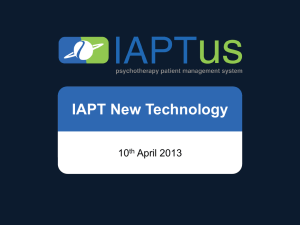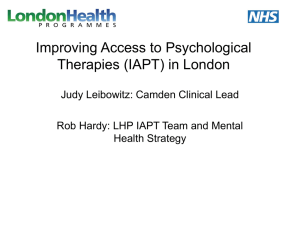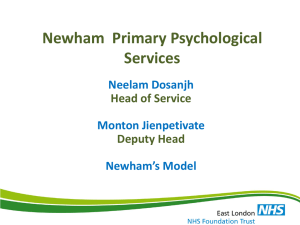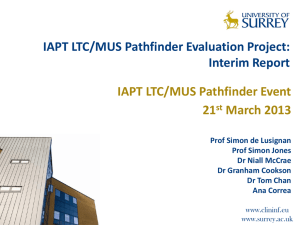Opportunities to work in a range of IAPT
advertisement
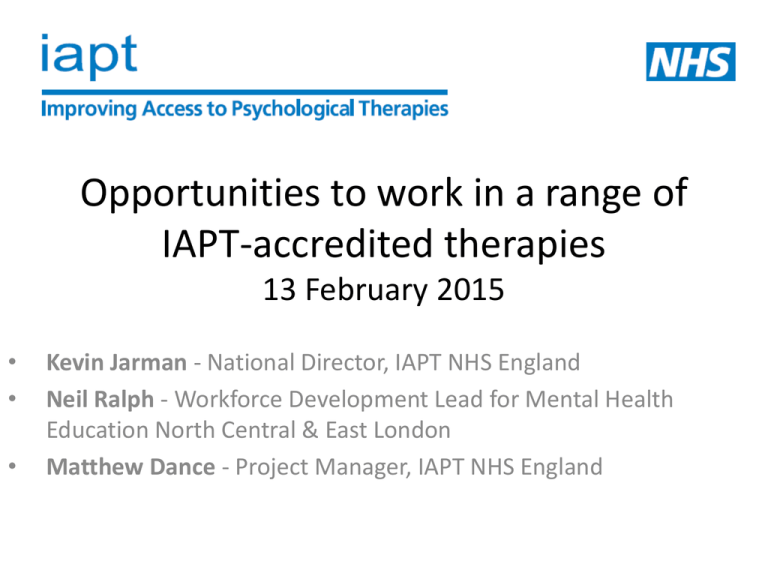
Opportunities to work in a range of IAPT-accredited therapies 13 February 2015 • • • Kevin Jarman - National Director, IAPT NHS England Neil Ralph - Workforce Development Lead for Mental Health Education North Central & East London Matthew Dance - Project Manager, IAPT NHS England In the beginning • The IAPT programme started in October 2008 with IAPT services established in 35 PCTs. • Asked to provide NICE approved and evidence based psychological therapies to 15% of people with depression & anxiety with 50% of those completing treatment reaching recovery. • Programme asked to train 6,000 new psychological therapies to provide high & low intensity brief Cognitive Behavioural Therapy interventions IAPT-accredited therapies To provide a choice of therapy, in addition to CBT, the IAPT programme worked with professional bodies to develop competency frameworks and curricula for four psychological therapies to broaden the range of therapies available to patients at step 3 1. 2. 3. 4. Brief Dynamic Interpersonal Therapy for Depression (DIT) Counselling for Depression Interpersonal Psychotherapy for Depression (IPT) Couple Therapy for Depression Four non-CBT psychological therapies training • Delivered both by High Intensity Therapists trained to deliver an additional modality of therapy or by therapists beyond the CBT workforce • CPD training programmes targeted at experienced staff who already accredited by their professional body • Relatively brief training (5 days) to up-skill them in specific additional competences surrounding their specific modality combined with supervised clinical practice for 6 to 9 moths to demonstrate through the assessment of recorded sessions that they have achieved the required level of competency. • Supervision training programmes provide additional training in supervision to experienced practitioners who have successfully completed the practitioner training programme. 2014 IAPT Workforce Composition Total Funded Establishment of 5967 WTE Employment Support 2% Qualified CBT High Intensity Therapist (HIT) 42% Non-IAPT ‘qualified’ counsellors & therapists 19% PWP 28% Total Four nonCBT HIT modalities 9% Information submitted from IAPT service providers April 2014 95% return rate IAPT workforce (Step 3) - expansion 2012 WTE 2014 WTE Variance Composition change 2012-2014 CBT High Intensity Therapist (HIT) 2019 2521 +502 -4% Counselling for Depression 123 262 +139 +3% Couples Therapy for Depression 75 86 +11 - Brief Dynamic Interpersonal Therapy 42 66 +24 - Interpersonal Psychotherapy 93 140 +47 +1% Total Four non-CBT HIT modalities 333 554 +221 +4% Total step 3 2352 3075 +723 - The Government’s new Mental Health Agenda Achieving Better Access to Mental Health Services by 2020 2015/16 IAPT Waiting times standards • Measured from receipt of referral to entering first treatment • Standard is for patients finishing a course of treatment (completing 2+ treatment appointments) 75% within 6 weeks 95% within 18 weeks • Local monitoring is expected of all patients in Q4 and thereafter • CCG’s have been asked to submit plans to meet this and we will start to report from April 2015 15-16 IAPT Waiting times standards • We are also developing number of contextual measures to guard against unintended consequences: A. giving a larger proportion of patients a single session of assessment and advice, rather than a course of therapy B. reducing the average number of sessions that are given to those people who have a course of therapy C. artificial treatment starts where patients have an early appointment but are then put on an ‘internal’ waiting list before a full course of treatment starts • offering a limited choice of NICE approved and evidence based therapy for depression and anxiety disorder (ACT)……… Action for Choice in therapy (ACT) • Single forum for decision making between NHS England IAPT team, Health Education England (HEE), professional bodies and experts by experience in relation to ensuring a choice of NICE approved and evidence based psychological therapies is available in IAPT services throughout England • Support CCGs & IAPT services to offer & deliver an effective choice of IAPT approved therapies • To monitor and evaluate the volume of different therapy session and patient outcomes delivered by IAPT service and CCG’s to inform future education commissioning Workforce and Education Planning Process Dr Neil Ralph Workforce Development Lead for Mental Health (Psychological Therapies Lead for London Region) IAPT training commissioning for London • HEE mandate- IAPT is a priority: – To train a sufficient workforce with the right skill mix • HEE Local Education and Training Boards (LETBs): – Workforce planning and commissioning – Responsive to local service needs and national strategy – HENCEL is the lead in London for IAPT (HENWL and HESL) • My role (Since June 2014): – To provide professional leadership, supporting NCEL with it’s mandated responsibility www.hee.nhs.uk www.ncel.hee.nhs.uk Workforce development • Other modality training is workforce development or CPPD – – – – – Not future workforce development (HIT and PWP) Accessed by staff already employed in IAPT Courses are delivered by accredited training providers Have own entrance criteria Supervision during training provided either in service or courses provide support with finding supervision – On going supervision is a service issue www.hee.nhs.uk www.ncel.hee.nhs.uk How is training funded? • Workforce Development Programme • LETBs invest in this via different funding streams: • Direct allocation: Money goes to NHS Trusts based upon head count to use as they choose • Services bid internally for staff to go on IAPT other modality training and supervisor training • This is based upon their perceived/ commissioned service needs – However……. www.hee.nhs.uk www.ncel.hee.nhs.uk How is training funded? • Transformation Fund to invest in system-wide transformation projects linked to HEE Mandate and local priorities, for example: – – – – – – – – – Dementia, Mental Health and Perinatal Mental Children and Young People End of Life Care Cavendish Care Certificate Public Health Clinical Academic Careers Cardiovascular Disease Improving Access to Psychological Therapies Widening Participation in Healthcare Careers www.hee.nhs.uk www.ncel.hee.nhs.uk London highlights for this year • Targeted transformation fund projects: – Investment in other modality training (training and supervision) • • • • • Counselling for Depression Dynamic Interpersonal Therapy Interpersonal Therapy Couples Therapy for Depression Behavioural Couples Therapy 20 14 26 9 28 – Collaboration with Tavistock & Portman Trust • Today’s ‘open day’ • Projects to support the future developments www.hee.nhs.uk www.ncel.hee.nhs.uk Predictions for the future (caveat- my opinion only) • IAPT will remain a mandated priority: – We will work closely with IAPT services and national strategy leads – We will support a coordinated approach: making best use of money available • Projects may include: – Supporting courses to deliver training effectively – Supporting services to increase choice – Supporting services with access to supervision www.hee.nhs.uk www.ncel.hee.nhs.uk Any questions? Contact us: ENGLAND.iapt@nhs.net www.iapt.nhs.uk www.hee.nhs.uk www.ncel.hee.nhs.uk



